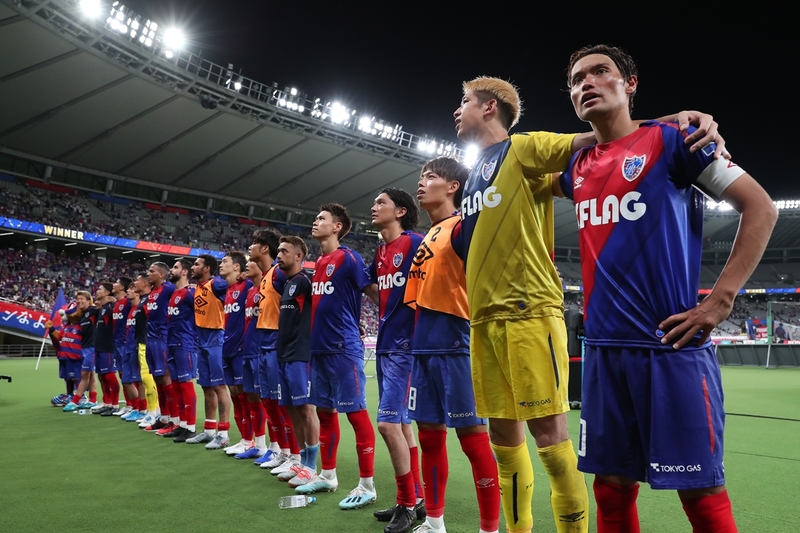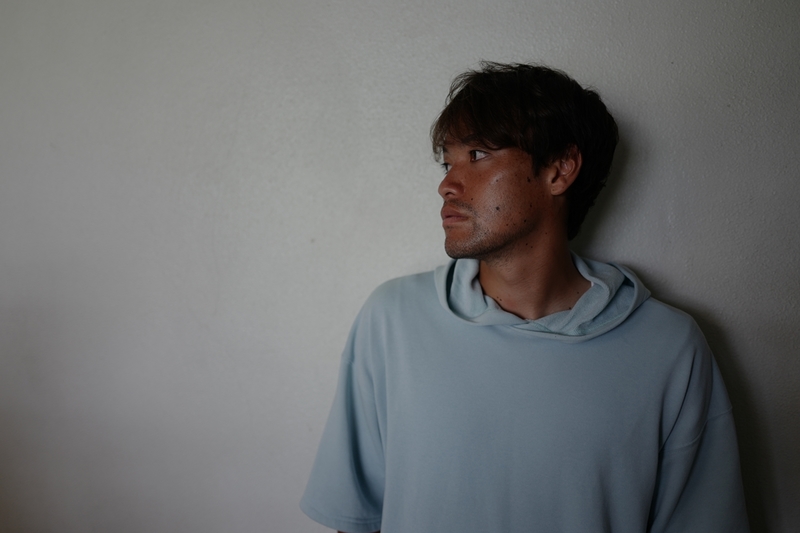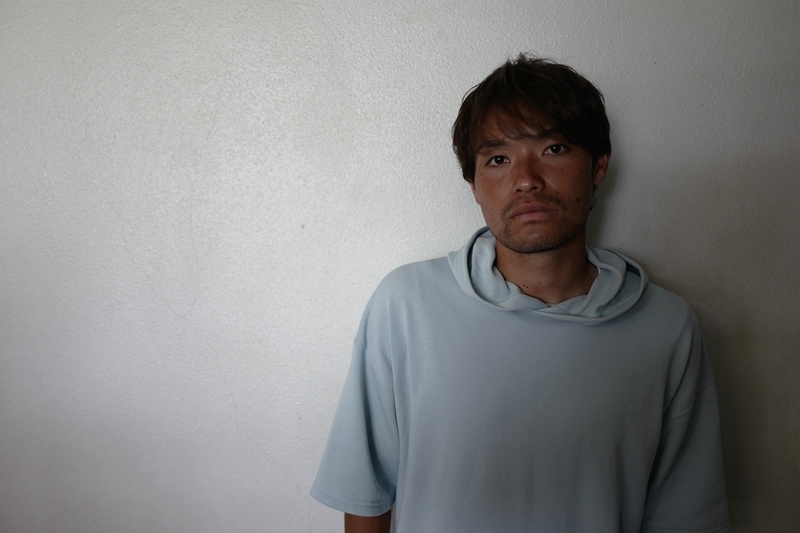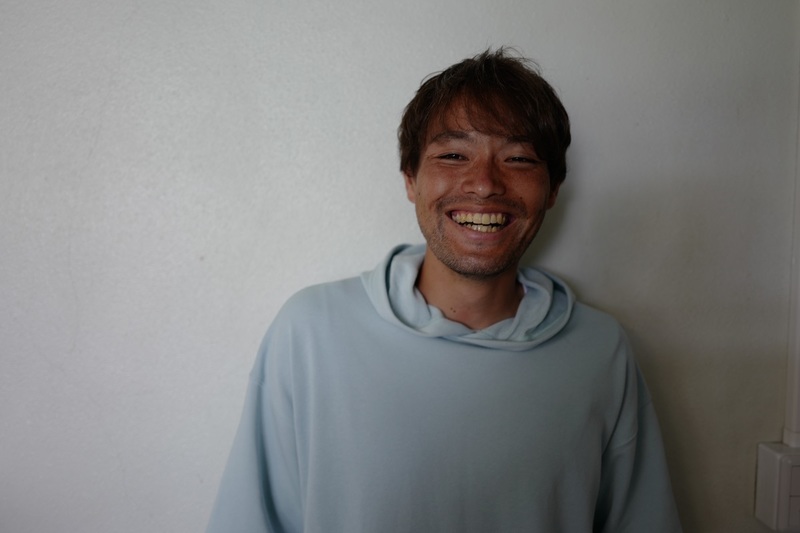There is a special time with the blue and red singers.
The armband on my left arm and the number 10 on my back, which I have been entrusted with this year, feel a little heavy.
However, the moment I listen to "You'll never walk alone", I feel like "I am not alone".
Beyond the time of dreams――.
Keigo HIGASHI and Tokyo Family walk together and continue to walk together.
Aiming for the first victory in the J1 League.
If it's Tokyo, it's gotta be Yuruneba!!

After the match against Sapporo in the 12th round of this season's J1 League, the Ajinomoto Stadium was filled with a chorus of "You'll never walk alone" in celebration of the 2-0 victory. This has become a tradition of victory since it was initiated by Keigo HIGASHI, who took on the role of captain this season.
It was when I saw the New Zealand national rugby team performing the Maori tribal dance "Haka" on a video streaming site before the game. "This is amazing," I was captivated. As I thought about how we could create this kind of unity at Ajinomoto Stadium, it hit me, "If it's FC Tokyo, it would be "Yuruneba"!!"
"This year, especially because we were winning at home, I wanted to turn the feeling of 'wanting to win more, wanting to be more passionate' into reality. I also wanted to share that feeling with the people who were there."
We called upon the fans and supporters to make this idea a reality, but there was also a slight sense of unease.
"I don't know if everyone coming to the stadium can sing, and maybe it won't get exciting,"
But that fear was unfounded. Along with the exhilaration of victory, the loud Yuruneva started playing in the stadium from the beginning. Higashi himself also said, "I studied so I could sing properly. It's not good if the one who suggested it can't sing," and quickly memorized the lyrics. Together with the blue and red singers, they raised their voices and sang passionately.
"This feels so good."
It was a great success. Especially the academy-trained players welcomed this. It's a song they've been listening to since they were young. There's no way your heart wouldn't be filled with warmth at that sight.
"It was great to hear (Go) HATANO, (Tsuyoshi) WATANABE, and (Kiichi) YAJIMA all say 'It's the best'. I thought, 'I hope this becomes a part of our daily lives from now on'. That was the moment I felt that."
I want to become passionate. If I were to tell someone from the past in the East that I said such words, the person from the East would be the most surprised.
"When I came here, to be honest, I didn't think deeply about it. Playing in games had become a given and my ambition had faded somewhere. I said I wasn't satisfied, but looking back now, I was satisfied just by participating in the Olympics."
The last time I wore the blue and red was in 2013, the year after the London Olympics where we made it to the semifinal for the first time in 44 years. At that time, Tokyo was far from the muddy reality and I had become somewhat indifferent."
"I always thought it was cool to be able to do anything smartly. It's good if I can give 100% in the game. I have my own way of doing things."
Results-oriented rather than process-oriented. If I can give my all in the game, it doesn't matter if there are days when I don't feel motivated during practice. I never doubted that this was the world of professionals."
Those backs that were there

I don't want to show my efforts to others. Such smoldering talent will soon reach a dead end. In August 2014, he suffered a right thigh muscle strain, which was his first long-term absence since turning professional. The diagnosis was a recovery period of about 6-8 weeks. He returned as planned after two months, but remained a substitute for the rest of the season.
"That's when I first thought this wouldn't do."
At that moment, coach Bruno Conca (at the time) called out to me, "Can I talk to you for a moment?"
"Why doesn't Keigo put in his full effort in daily practice, when he works so hard during games?"
He was hit where it hurt. From that day on, he changed his attitude and daily routine. He learned, appreciated, and sweat every day. As he walked with his hands in his pockets, the scenery changed as well. Keigo, who originally wasn't interested in people, realized that there were many role models right beside him.
"Seeing the attitudes of players like Naotake HANYU and Naohiro ISHIKAWA may have been a big influence. Those people were always thinking about the team. But when they stepped onto the pitch, they were able to show their strengths. It was a really good learning experience. I had many opportunities to go out to eat with Naohiro and we talked about many things. As I listened to his passionate feelings towards Tokyo, it became natural for me to also want to make this team stronger. That's why my attachment and feelings towards Tokyo have also grown stronger."
I was moved by the sight of their small bodies surviving in the tough world of professional football and struggling with injuries. Those thoughts naturally began to well up within me.
And as I watch the figure of Hayu, who supports the team as a famous player, I begin to see my own future reflected in him. Higashi will continue.
"Originally, I was a player who had to coexist with those around me. I'm not the type of player who can do things alone, and I have to synchronize my breathing with those around me. That's what I learned from Mr. Nyu."
For the team, I continue to support someone in both attack and defense. Always keep an eye on the surroundings and fill in the gaps. Never let anyone be alone on the pitch.
You'll never walk alone ――。
Suddenly, that phrase had become a perfect fit for the player.
(Continued in Part 2)
◇Keigo HIGASHIProfile
text by Kohei Baba




